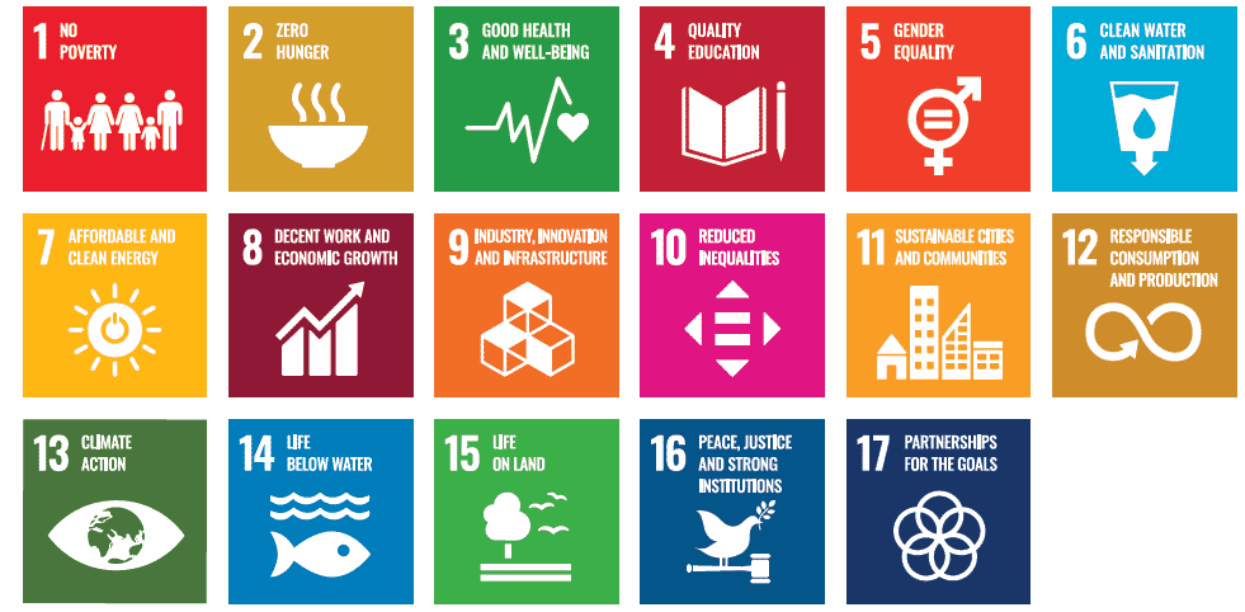
This article is the first in a series about the United Nations Sustainable Development Goals – UN SDGs for short – and their relevance to our industry. We’ll be looking what they are, what their purpose is, why you should be interested and the benefits to your business of understanding and using them.
A truly sustainable business is one that lasts: the cash flow is good and well managed; the workforce is effective and motivated, with the right skills; energy and resources are managed and protected. It is a trilogy of people-planet-profit. A business that looks ahead and is prepared, that protects future resources and itself.
The Sustainable Development Goals were created as a plan to achieve this for the planet, and they have been adopted by countries all around the world. Published in 2015, they are at the heart of Agenda 2030, the UN’s “plan of action for people, planet and prosperity”. They shape policy and legislation and are used not just by governments globally, but by businesses too, choosing those that are most relevant to them.
They will therefore affect your business – either through customer demand or through regulation or policy – and understanding them will therefore help your business strategy. You will be able to plan ahead for future policies and laws implementing them and will find it easier to predict customer demands and be prepared for them.
It often seems as if society just leaps from one concern to the next – one year it’s forest depletion, the next it’s recycling. Then it’s everyone must calculate their carbon footprint and look at offsetting, then it’s #MeToo. Now it’s plastic. Businesses that are simply reactive are pushed from pillar to post, always playing catch-up.
But all of these issues have been known for some time, and are incorporated in the SDGs, which build upon the preceding UN Millennium Development Goals. Understanding the SDGs, and where they touch what our industry does, means you are unlikely to be caught out and surprised by whatever is the latest environmental or social and ethical issue to hit the headlines – because you’ll have already thought about it and taken any necessary action.
At top level, the SDGs are simply mission statements, and understanding the implications to any business may not be obvious if you just look at the headline statements.
But, like any business plan, they also have targets and indicators, to act as a route map and to check if the plan is working. These are where you can find the detail and see where they are relevant to whatever your business is or does.
Only some of them will be directly applicable to any one business, and the way they apply may vary in different parts of the value chain: the end-users, buyers, providers, equipment and consumables suppliers and so forth, sometimes working together. They are all interconnected, and they also have connections with the global megatrends affecting us all and of major interest to the world of finance.
This series of articles will be focusing on the SDGs from a business point of view, and specifically the SDGs relevant to climate change – including preparing for its effects on your business; resource use; chemicals, air and water; and social and employment issues.
But to start with, here are the headline statements for each of the icons pictured above.
Goal 1. End poverty in all its forms everywhere
Goal 2. End hunger, achieve food security and improved nutrition and promote sustainable agriculture
Goal 3. Ensure healthy lives and promote well-being for all at all ages
Goal 4. Ensure inclusive and equitable quality education and promote lifelong learning opportunities for all
Goal 5. Achieve gender equality and empower all women and girls
Goal 6. Ensure availability and sustainable management of water and sanitation for all
Goal 7. Ensure access to affordable, reliable, sustainable and modern energy for all
Goal 8. Promote sustained, inclusive and sustainable economic growth, full and productive employment and decent work for all
Goal 9. Build resilient infrastructure, promote inclusive and sustainable industrialization and foster innovation
Goal 10. Reduce inequality within and among countries
Goal 11. Make cities and human settlements inclusive, safe, resilient and sustainable
Goal 12. Ensure sustainable consumption and production patterns
Goal 13. Take urgent action to combat climate change and its impacts
Goal 14. Conserve and sustainably use the oceans, seas and marine resources for sustainable development
Goal 15. Protect, restore and promote sustainable use of terrestrial ecosystems, sustainably manage forests, combat desertification, and halt and reverse land degradation and halt biodiversity loss
Goal 16. Promote peaceful and inclusive societies for sustainable development, provide access to justice for all and build effective, accountable and inclusive institutions at all levels
Goal 17. Strengthen the means of implementation and revitalize the Global Partnership for Sustainable Development
The next article in this series will be focusing on SDG 13: Take urgent action to combat climate change and its impacts. Beyond reducing carbon emissions, what businesses can do for themselves to prepare for the consequences of climate change. What ways are they likely to be affected?
About Clare Taylor
Clare is a well-known industry figure and speaker at numerous conferences on print, paper and related environmental issues, both in the UK and mainland Europe. In 1994 she was named Print Buyer of the Year at the Celebration of Print awards ceremony, and in 2003 was named Printing World Print Personality of the year.
Her background extends over 30 years in the graphic arts field, initially working for both agencies and major corporates in art and print buying. Since setting up the consultancy, customers have included a variety of printers, paper companies and those in related areas plus industry bodies.
Clare is a Chartered Environmentalist, a full Member of the Institute of Environmental Management and Assessment, a Registered Environmental Auditor, a Member of the Institute of Paper, Printing and Publishing and an Affiliate Member of the Chartered Institution of Wastes Management.